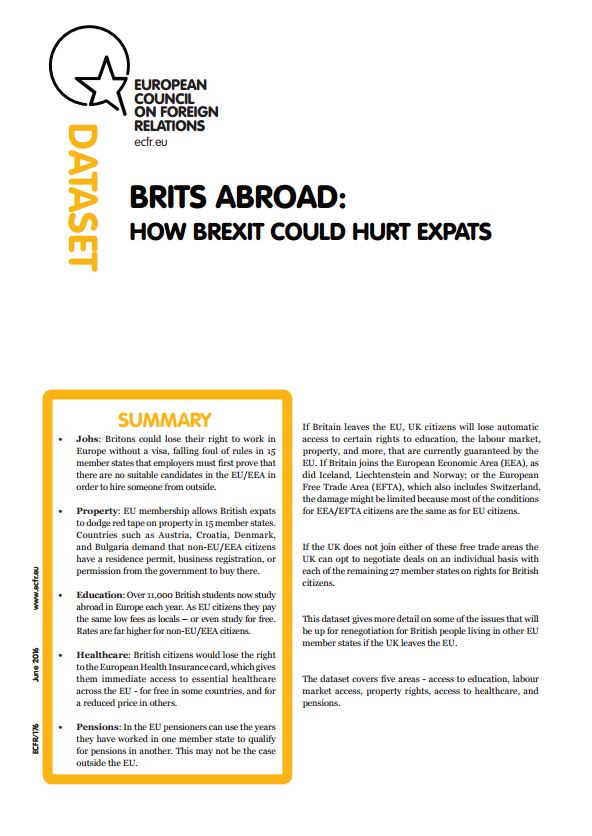Brits abroad: How Brexit could hurt expats
A British exit from the EU could jeopardise the jobs, homes, and healthcare of the 1.2 million Brits living in Europe, according to new research from ECFR
A British exit from the EU could jeopardise the jobs, homes, and healthcare of the 1.2 million Brits living in Europe, according to new research from the European Council on Foreign Relations.
ECFR’s network of researchers across the 28 member states gathered data on exactly what a Brexit might mean for expats in their countries, setting out the rules on working, studying, buying property, and accessing healthcare and pensions for EU versus non-EU citizens.
After a Brexit, the UK would have two options. One is to join Iceland and Norway in the European Economic Area (EEA), or Switzerland in the European Free Trade Area (EFTA), but the price would be continuing to follow current EU rules on freedom of movement. The other option is for London to negotiate separate deals with each of the 27 member states on the jobs, homes, and healthcare of its citizens abroad. ECFR’s report looks at what would be up for negotiation in these talks.
“Brits abroad: How Brexit could hurt expats” found that these new deals could mean drastic changes in five key areas:
Jobs: Britons could lose their right to work in Europe without the need for a visa, falling foul of rules in 15 member states that employers must first prove that there is no suitable candidate in the entire EU/EEA in order to hire someone from outside.
Property: EU membership allows British expats to dodge red tape on property in 16 member states. Countries such as Austria, Croatia, Denmark, and Bulgaria demand that non-EU/EEA citizens have a residence permit, business registration, or permission from the government to buy there.
Education: Over 11,000 British students now study abroad in Europe each year. As EU citizens they pay the same low fees as locals – or even study for free – in countries including Austria, Denmark, Finland, Greece, and Sweden. Rates are far higher for non-EU/EEA citizens.
Healthcare: British citizens would lose the right to the European Health Insurance card, which gives them immediate access to essential healthcare across the EU – for free in some countries, and for a reduced price in others.
Pensions: Pensioners are the biggest group of British expats in Europe, and they can use the years they have worked in one member state to qualify for pensions in another. For example, in Germany EU citizens can count years worked elsewhere to meet the minimum requirements for a pension.
Author Dina Pardijs said:
“Amid the Punch and Judy politics of the referendum campaign, one group is following developments with extra concern – the 1.2 million British citizens living in other EU countries. If there is a Brexit, it will be their homes, jobs, education, and future prospects that are used as a bargaining chip between a retreating UK and the rejected EU member states.”
“In a campaign where facts are in short supply, it is important to know what could change for Brits abroad if we leave the EU. Long-time British expats will be unable to vote, but their lives may be radically altered. Everything will be on the table – the chance to work in Europe, to study, and keep easy access to their pensions and to essential healthcare.”
“No one really knows what the consequences will be for Brits abroad if there is a vote for Brexit. Expats who are still eligible to vote have good reason to make sure they post their ballot papers in time to be counted on June 23.”
The European Council on Foreign Relations does not take collective positions. ECFR publications only represent the views of their individual authors.



